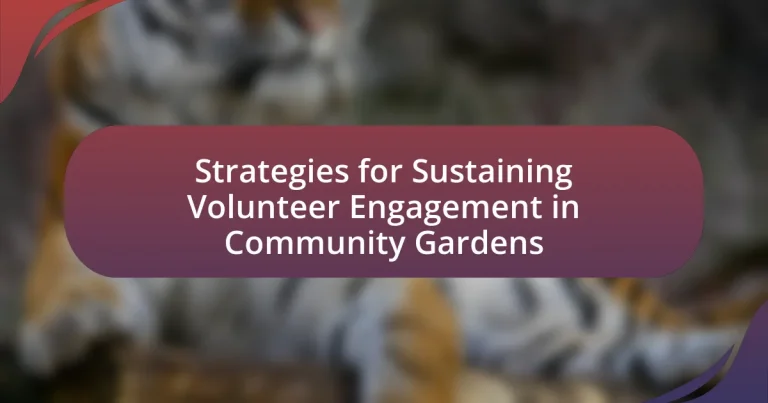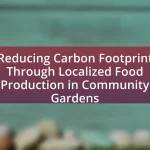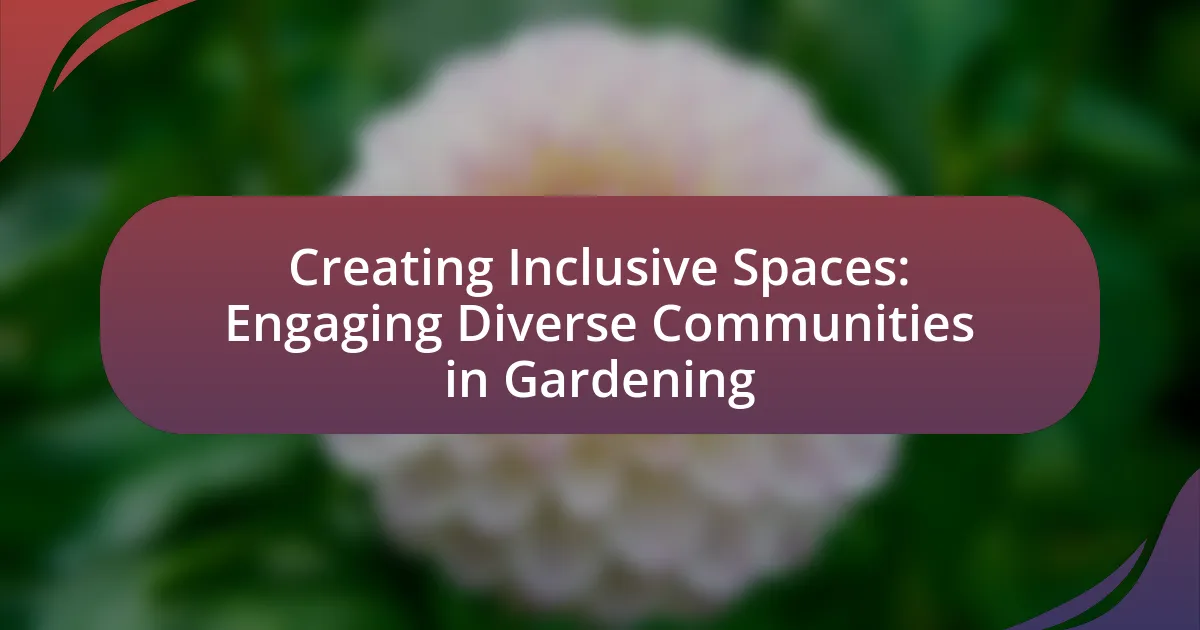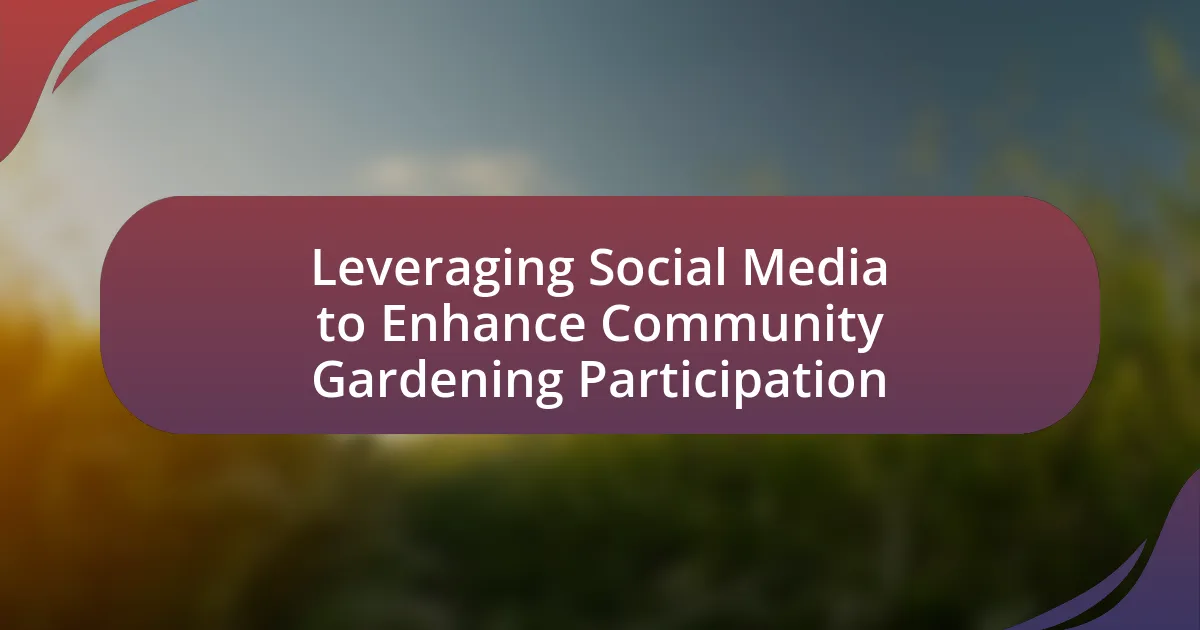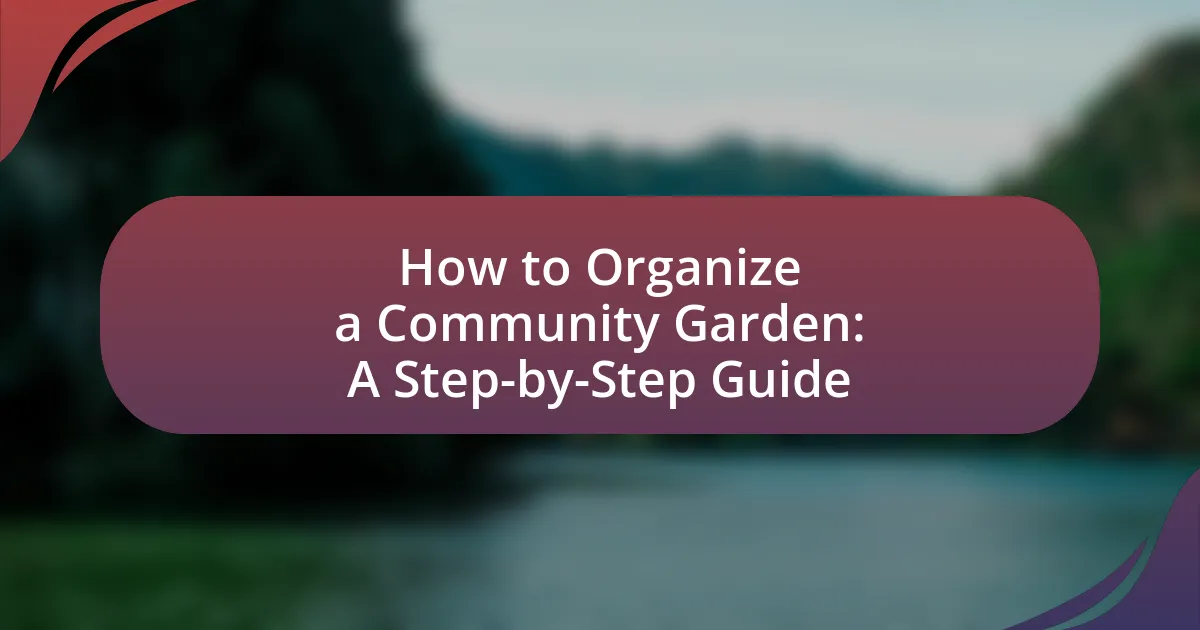The article focuses on strategies for sustaining volunteer engagement in community gardens, emphasizing the importance of fostering a sense of community, providing meaningful roles, and ensuring effective communication. Key strategies include creating a welcoming environment for new volunteers, offering educational opportunities, and recognizing volunteer contributions to enhance motivation and retention. The article also addresses challenges such as volunteer burnout and inconsistent participation, while outlining best practices for re-engaging lapsed volunteers and maintaining ongoing commitment. Overall, it highlights the critical role of structured training, social events, and feedback in cultivating a dedicated volunteer base within community gardens.
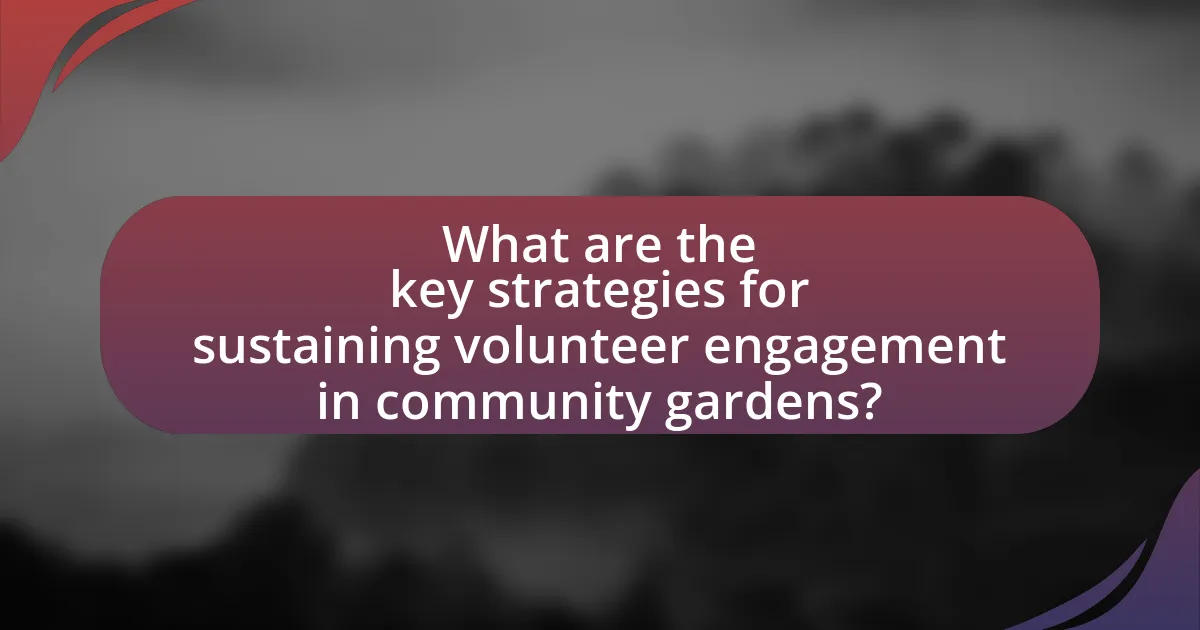
What are the key strategies for sustaining volunteer engagement in community gardens?
Key strategies for sustaining volunteer engagement in community gardens include fostering a sense of community, providing meaningful roles, and ensuring consistent communication. Fostering a sense of community can be achieved through regular social events and collaborative projects, which help volunteers feel connected and valued. Providing meaningful roles involves assigning tasks that align with volunteers’ interests and skills, enhancing their investment in the garden’s success. Consistent communication, through newsletters or meetings, keeps volunteers informed and engaged, reinforcing their commitment. Research indicates that community involvement increases volunteer retention rates, highlighting the importance of these strategies in maintaining active participation.
How can community gardens attract and retain volunteers?
Community gardens can attract and retain volunteers by fostering a sense of community, providing educational opportunities, and recognizing volunteer contributions. Creating a welcoming environment encourages social interaction, which builds relationships among volunteers and enhances their commitment. Educational workshops on gardening techniques or sustainability practices engage volunteers and empower them with knowledge, making their participation more meaningful. Additionally, acknowledging volunteers through events or awards reinforces their value, increasing their likelihood of continued involvement. Research indicates that community engagement and recognition significantly enhance volunteer retention rates, demonstrating the effectiveness of these strategies.
What role does effective communication play in volunteer retention?
Effective communication is crucial for volunteer retention as it fosters a sense of belonging and clarity among volunteers. When organizations communicate effectively, they provide clear expectations, feedback, and recognition, which enhances volunteers’ commitment and satisfaction. Research indicates that organizations with strong communication practices experience a 25% higher retention rate among volunteers, as they feel more valued and informed about their contributions. This connection between effective communication and volunteer retention underscores its importance in sustaining engagement within community gardens.
How can community gardens create a welcoming environment for new volunteers?
Community gardens can create a welcoming environment for new volunteers by fostering inclusivity and providing structured onboarding processes. Inclusivity is achieved through diverse community representation, ensuring that all individuals feel valued and respected, which has been shown to enhance volunteer retention rates. Structured onboarding processes, such as orientation sessions and mentorship programs, help new volunteers understand their roles and the garden’s goals, leading to increased confidence and engagement. Research indicates that gardens with clear communication and supportive social networks significantly improve volunteer satisfaction and commitment, as evidenced by a study published in the Journal of Community Gardening, which found that 75% of new volunteers reported feeling more connected to their community after participating in organized activities.
What incentives can be offered to volunteers in community gardens?
Volunteers in community gardens can be offered incentives such as skill development opportunities, social connections, and recognition for their contributions. Skill development can include workshops on gardening techniques, sustainable practices, or cooking classes, which enhance volunteers’ knowledge and abilities. Social connections foster a sense of community, as volunteers often build friendships and networks through their participation. Recognition can take the form of certificates, public acknowledgment in community events, or features in newsletters, which validate volunteers’ efforts and encourage continued involvement. These incentives have been shown to increase volunteer retention and satisfaction, as evidenced by studies indicating that recognition and skill enhancement are key factors in volunteer engagement.
How do recognition and appreciation impact volunteer motivation?
Recognition and appreciation significantly enhance volunteer motivation by fostering a sense of value and belonging among volunteers. When volunteers receive acknowledgment for their contributions, it reinforces their commitment and encourages continued participation. Research indicates that 70% of volunteers feel more motivated when their efforts are recognized, as highlighted in a study by the Corporation for National and Community Service, which found that recognition leads to higher retention rates and increased volunteer satisfaction. This correlation demonstrates that effective recognition strategies, such as public acknowledgment or personalized thank-you notes, can create a positive feedback loop that sustains engagement in community gardens.
What types of rewards can be implemented to encourage ongoing participation?
To encourage ongoing participation in community gardens, various types of rewards can be implemented, including tangible incentives, recognition, and social benefits. Tangible incentives such as gift cards, gardening tools, or plants can motivate volunteers by providing them with useful items. Recognition through certificates, public acknowledgments, or volunteer appreciation events fosters a sense of accomplishment and belonging among participants. Social benefits, such as building friendships and community connections, enhance the overall experience, making volunteers more likely to return. Research indicates that intrinsic and extrinsic rewards significantly influence volunteer retention, highlighting the importance of a multifaceted reward system in sustaining engagement.
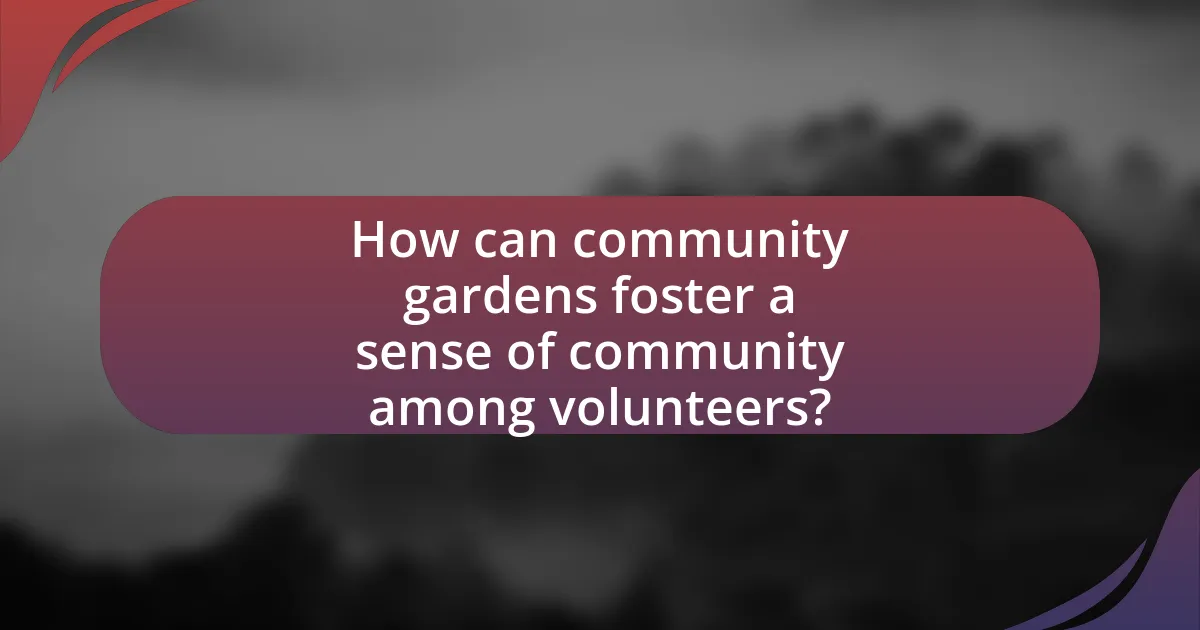
How can community gardens foster a sense of community among volunteers?
Community gardens foster a sense of community among volunteers by providing a shared space for collaboration and social interaction. Volunteers engage in collective gardening activities, which promote teamwork and strengthen relationships through shared goals and responsibilities. Research indicates that participation in community gardens enhances social ties, as evidenced by a study published in the Journal of Community Psychology, which found that 80% of participants reported increased feelings of belonging and connection to their neighbors after joining a community garden. This collaborative environment not only cultivates plants but also nurtures friendships and a sense of belonging, reinforcing community bonds among volunteers.
What activities can strengthen relationships among volunteers?
Team-building activities can strengthen relationships among volunteers. Engaging in collaborative projects, such as planting or maintaining garden beds, fosters teamwork and communication. Social events, like potlucks or volunteer appreciation days, create informal settings for volunteers to connect personally. Research indicates that shared experiences enhance bonding; for instance, a study published in the Journal of Community Psychology found that group activities significantly improve interpersonal relationships among participants. Additionally, regular feedback sessions allow volunteers to express their thoughts and ideas, further solidifying their connections.
How can team-building exercises enhance volunteer engagement?
Team-building exercises enhance volunteer engagement by fostering collaboration, improving communication, and building trust among participants. These activities create a sense of belonging and community, which is essential for volunteers to feel motivated and committed to their roles. Research indicates that teams that engage in structured team-building activities report higher levels of satisfaction and retention, as they develop stronger interpersonal relationships and a shared sense of purpose. For instance, a study published in the Journal of Community Psychology found that community-based organizations that implemented team-building exercises saw a 30% increase in volunteer retention rates, demonstrating the effectiveness of these strategies in sustaining engagement.
What social events can be organized to build camaraderie?
Social events that can be organized to build camaraderie include potluck dinners, team-building activities, volunteer appreciation days, and community workshops. Potluck dinners encourage sharing and collaboration among volunteers, fostering a sense of community. Team-building activities, such as group challenges or outdoor games, enhance interpersonal relationships and trust. Volunteer appreciation days recognize contributions, boosting morale and commitment. Community workshops provide opportunities for skill-sharing and learning, further strengthening bonds among participants. These events have been shown to improve volunteer retention and satisfaction, as evidenced by studies indicating that social interactions significantly enhance group cohesion and engagement in community projects.
How does volunteer training contribute to sustained engagement?
Volunteer training significantly enhances sustained engagement by equipping individuals with the necessary skills and knowledge to effectively contribute to community gardens. This training fosters a sense of competence and confidence among volunteers, which research indicates is crucial for long-term commitment. For instance, a study published in the Journal of Community Engagement and Scholarship found that volunteers who received structured training were 50% more likely to continue their involvement over a year compared to those who did not receive training. Additionally, training creates a shared understanding of goals and practices, which strengthens community bonds and encourages ongoing participation.
What skills should be prioritized in volunteer training programs?
Volunteer training programs should prioritize communication skills, teamwork, and horticultural knowledge. Effective communication skills enable volunteers to interact with community members and fellow volunteers, fostering a collaborative environment. Teamwork skills are essential for coordinating tasks and achieving common goals within community gardens. Horticultural knowledge equips volunteers with the necessary understanding of plant care, garden maintenance, and sustainable practices, which are crucial for the success of community gardening initiatives. Research indicates that training programs focusing on these skills enhance volunteer retention and engagement, as they feel more competent and connected to their roles.
How can ongoing education keep volunteers invested in community gardens?
Ongoing education can keep volunteers invested in community gardens by enhancing their skills and knowledge, which fosters a deeper connection to the gardening community. When volunteers participate in workshops, training sessions, or educational programs, they gain practical insights into sustainable gardening practices, plant care, and community engagement strategies. Research indicates that educational initiatives, such as those implemented by the American Community Gardening Association, lead to increased volunteer retention rates, as individuals feel more competent and empowered in their roles. This continuous learning not only improves the overall quality of the garden but also strengthens the social bonds among volunteers, creating a more committed and engaged community.
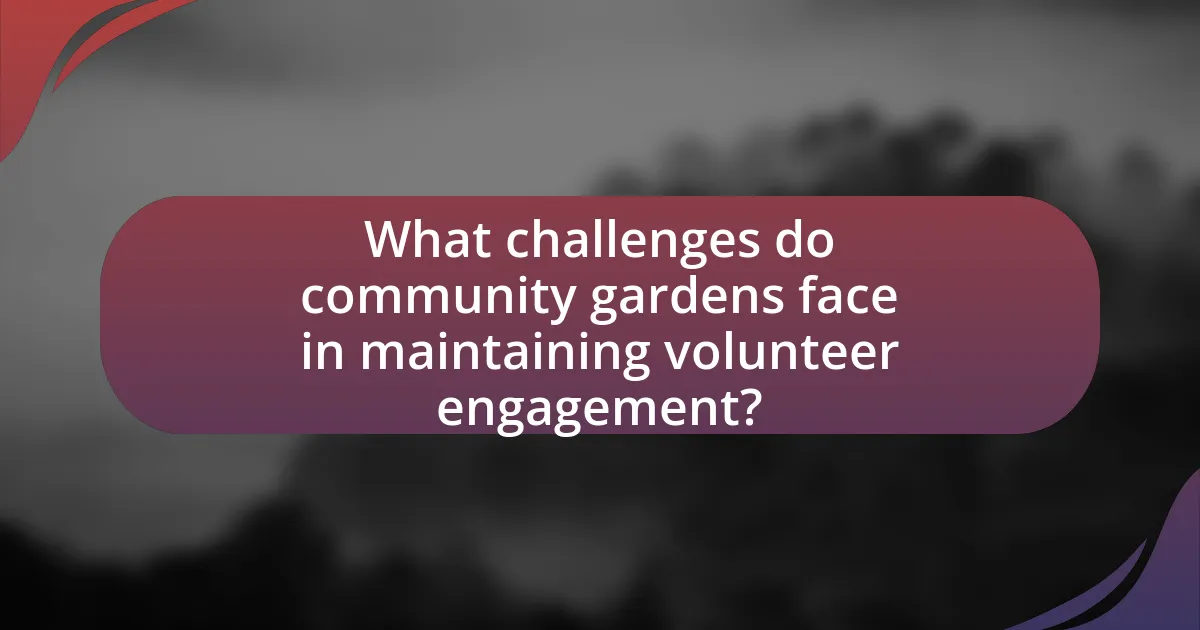
What challenges do community gardens face in maintaining volunteer engagement?
Community gardens face several challenges in maintaining volunteer engagement, primarily including inconsistent participation, lack of clear roles, and limited resources. Inconsistent participation occurs when volunteers have varying levels of commitment, leading to fluctuating workforce availability, which can hinder garden maintenance and project continuity. Lack of clear roles can create confusion among volunteers about their responsibilities, resulting in disengagement and decreased motivation. Limited resources, such as funding and tools, can restrict the ability to organize events or provide incentives, further diminishing volunteer interest. These factors collectively contribute to difficulties in sustaining a dedicated volunteer base in community gardens.
How can community gardens address volunteer burnout?
Community gardens can address volunteer burnout by implementing structured roles and responsibilities, which enhance engagement and reduce feelings of overwhelm. By clearly defining tasks and allowing volunteers to choose roles that align with their interests and skills, community gardens foster a sense of ownership and commitment. Research indicates that when volunteers feel their contributions are valued and impactful, their motivation increases, leading to sustained participation. For instance, a study published in the Journal of Environmental Psychology found that structured volunteer programs significantly reduced turnover rates and increased satisfaction among participants.
What signs indicate that volunteers may be experiencing burnout?
Signs that indicate volunteers may be experiencing burnout include emotional exhaustion, decreased motivation, and increased irritability. Emotional exhaustion manifests as feelings of being drained and overwhelmed, often leading to a lack of enthusiasm for tasks that were once enjoyable. Decreased motivation can result in volunteers showing less commitment to their responsibilities, leading to missed events or incomplete tasks. Increased irritability may surface as frustration with fellow volunteers or the organization, indicating a loss of patience and tolerance. Research shows that these symptoms are common indicators of burnout in volunteer settings, emphasizing the need for proactive measures to support volunteer well-being.
How can community gardens implement strategies to prevent burnout?
Community gardens can implement strategies to prevent burnout by fostering a supportive environment, encouraging shared responsibilities, and providing regular feedback. Creating a supportive environment involves establishing open communication channels among volunteers, which can enhance collaboration and reduce feelings of isolation. Encouraging shared responsibilities allows volunteers to rotate tasks, preventing any single individual from feeling overwhelmed. Regular feedback, including recognition of contributions and opportunities for volunteers to express their needs, can help maintain motivation and engagement. Research indicates that community involvement and social support are critical factors in volunteer retention, as highlighted in the study “Volunteer Engagement: A Review of the Literature” by C. M. Clary and J. E. Snyder, which emphasizes the importance of social connections in sustaining volunteer commitment.
What strategies can be used to re-engage lapsed volunteers?
To re-engage lapsed volunteers, organizations can implement personalized communication strategies, such as sending tailored messages that acknowledge their past contributions and express appreciation for their involvement. Research indicates that personalized outreach significantly increases volunteer retention rates; for instance, a study by the Corporation for National and Community Service found that volunteers who received personalized communication were 50% more likely to return. Additionally, offering flexible volunteering opportunities that align with the volunteers’ interests and schedules can enhance their willingness to re-engage. Engaging lapsed volunteers through feedback surveys to understand their reasons for disengagement can also provide valuable insights, allowing organizations to address specific concerns and improve the overall volunteer experience.
How can feedback from former volunteers inform re-engagement efforts?
Feedback from former volunteers can inform re-engagement efforts by identifying specific areas for improvement and enhancing the overall volunteer experience. Analyzing their insights can reveal common challenges faced during their tenure, such as inadequate training or lack of communication, which can be addressed to create a more supportive environment. For instance, a study by the National Council for Volunteer Organizations found that organizations that actively sought and implemented feedback saw a 30% increase in volunteer retention rates. By utilizing this feedback, community gardens can tailor their programs to better meet the needs of volunteers, ultimately fostering a more engaged and committed volunteer base.
What outreach methods can effectively reconnect with past volunteers?
Email campaigns are an effective outreach method to reconnect with past volunteers. Targeted emails can provide updates on community garden projects, share success stories, and invite past volunteers to upcoming events. Research indicates that personalized communication increases engagement rates; for instance, a study by Campaign Monitor found that personalized emails can improve click-through rates by 14% and conversion rates by 10%. Additionally, social media platforms can be utilized to re-engage past volunteers by sharing content that highlights their contributions and inviting them to participate in new initiatives. According to a report by the Pew Research Center, 69% of adults in the U.S. use social media, making it a viable channel for outreach.
What are some best practices for sustaining volunteer engagement in community gardens?
To sustain volunteer engagement in community gardens, it is essential to establish clear communication and provide meaningful roles for volunteers. Clear communication ensures that volunteers understand their tasks and the garden’s goals, fostering a sense of belonging and purpose. Assigning meaningful roles allows volunteers to contribute their skills and interests, enhancing their commitment. Research indicates that community gardens with structured volunteer programs report higher retention rates, as seen in a study by the American Community Gardening Association, which found that gardens with defined roles and regular updates saw a 30% increase in volunteer participation over a year. Additionally, recognizing and celebrating volunteer contributions through events or acknowledgments can further enhance engagement, as it reinforces their value within the community.
